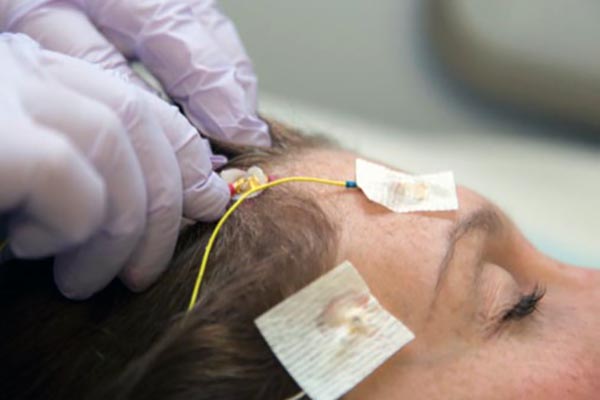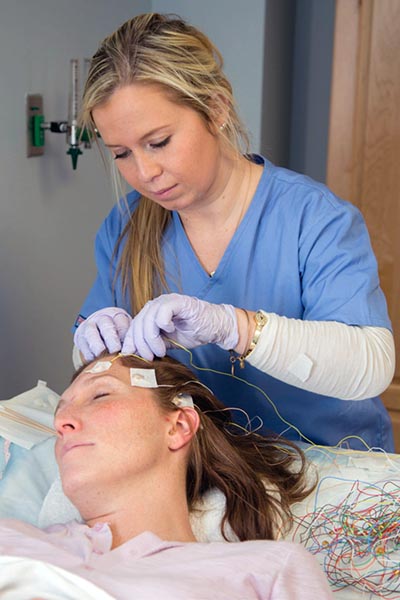School of Clinical Neurophysiology
 Crozer-Chester Medical Center’s School of Clinical Neurophysiology was founded in 1973.
Crozer-Chester Medical Center’s School of Clinical Neurophysiology was founded in 1973.
Neurodiagnostic Technology (NDT), formerly known as Electroneurodiagnostic (END) or Electroencephalographic (EEG) Technology, is a clinical and scientific field devoted to the recording and study of electrical activity in the brain (brain waves), nervous system and other physiological variables, such as eye movements, muscle activity, cardiac rhythms and respiratory events. Neurodiagnostic technologists deal with a variety of patients of all ages.
NDT students receive the instruction necessary to perform electroencephalographic testing and introductory level instruction in polysomnography, evoked potential testing, nerve conduction studies, intraoperative neurophysiologic monitoring and long-term EEG monitoring in the Epilepsy Monitoring Units and Intensive Care Units. These procedures are essential for the clinical investigation of neurological, neurosurgical and sleep disorders, including epilepsy, brain injuries, stroke, brain tumors, “brain death”, insomnia, excessive daytime sleepiness, sleep apnea, narcolepsy and multiple sclerosis.
Students will also gain the technical skills necessary to operate sophisticated NDT equipment in a variety of settings, including both inpatient and outpatient settings, operating rooms and intensive care units.
Students are required to participate in clinical rotations two days per week along with one day a week in a lecture during most of this program.
Learn More
 About Clinical Neurophysiology
About Clinical Neurophysiology
Employment opportunities in the field of Neurodiagnostic Technology are excellent. In recent years there has been an increase in the utilization of EEG and Electroneurodiagnostic procedures and a shortage of trained technologists. Graduates from accredited NDT training programs have employment opportunities at hospitals, physicians' offices and businesses providing medical and surgical equipment.
Accreditation
The Crozer-Chester Medical Center School of Clinical Neurophysiology is accredited by the Commission on Accreditation of Allied Health Education Programs (www.caahep.org) upon the recommendation of the Committee on Education for Neurodiagnostic Technology Programs.
Commission on Accreditation of Allied Health Education Programs
9355 -113th St. N. #7709
Seminole, FL 33775
727-210-2350 ext. 104
katie@caahep.org
www.caahep.org
Graduation
Upon successful completion of all required courses, students receive a Certificate in Neurodiagnostic Technology awarded by Crozer-Chester Medical center.
Job Outlook
Employment opportunities in the field of NDT are excellent. In recent years there has been an increase in the utilization of EEG and neurodiagnostic procedures and a shortage of trained technologists. Graduates from accredited NDT training programs have employment opportunities at hospitals, physicians' offices, staffing agencies and businesses providing medical and surgical equipment.
Wages for EEG technologists vary based on location, education and level of experience. According to ASET’s Salary and Benefits report, “overall, the mean salary for Neurodiagnostic technologists in the field is $68,524.” The entry-level NDT position starts at about $48,000. Compensation increases after passing national registry exams. Supervisory and teaching positions are available with additional education and experience.
Graduate Employment Statistics:
- 2023: Seated 100%, Online 100%
- 2022: Seated 100%, Online 100%
- 2021: Seated 100%, Online 100%
Each fall, 12 seats will be awarded to each seated cohort. Students are accepted into the program on a first come first qualified basis. Please see the information for admission requirements.
Contact Us
For more information please contact:
School of Clinical Neurophysiology
Crozer-Chester Medical Center
One Medical Center Blvd.
Upland, PA 19013
Amy Johnson, BS, R. EEG/EP T., R.NCS.T., CLTM
Program Director
Phone: 610-447-2920
Fax: 610-447- 2918
Email: Amy.johnson@crozer.org
